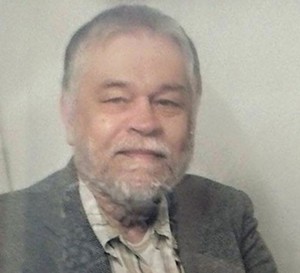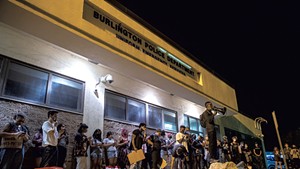
- Courtesy of WCAX-TV
- Ralph "Phil" Grenon
A two-year investigation into the fatal 2016 police shooting of Ralph "Phil" Grenon has concluded that numerous missteps by the Howard Center and Burlington police led to his death.
The findings are contained in a 63-page report submitted to lawmakers Wednesday by a commission created in 2017 to study law enforcement interactions with people in mental health crisis.
Members of the Vermont Mental Health Crisis Response Commission were split in their assessment of how officers handled the hours-long standoff with the 76-year-old Grenon in his Burlington apartment. But the report vividly recounts the months of communication breakdowns and inadequate health care that precipitated Grenon's fatal encounter with police.
"If there's one thing that's clear to me from this, it's that his death was preventable," said commission chair Wilda White, former executive director of Vermont Psychiatric Survivors. "This was so preventable."
Grenon, a paranoid schizophrenic in the midst of a psychotic break, was shot and killed March 21, 2016, as he charged police officers who'd entered his South Square apartment holding riot shields. They found him hiding in his shower with a kitchen knife in each hand. Officers fired their Tasers, Grenon charged, and they shot him dead.
Then-attorney general Bill Sorrell and Chittenden County state's attorney T.J. Donovan later determined that the shooting was justified.
The commission met monthly, interviewed a dozen witnesses and compiled documents to create a detailed narrative of the fatal encounter and the year preceding it.
It found that Grenon, a grandfather and trained college instructor, had been experiencing a deterioration in his mental health in 2015. Months before his death, Grenon stopped taking his medication, skipped appointments and left numerous hostile and threatening voicemails for his Howard Center psychiatrist, who'd recently also assumed the role of case manager.
Three times in the weeks before Grenon's death, Howard Center staff "actually warned or indicated that individuals and organizations should be warned of threats of harm made by Mr. Grenon in voicemail messages." But the Howard Center did not seek to place Grenon in involuntary treatment, according to the report, and did not create a written treatment strategy to address the heightened risk.
Grenon's daughter has said his family repeatedly asked doctors to have Grenon involuntarily committed to a hospital before he died.
A week before the 911 call that prompted a police response, Grenon left a voicemail for his Howard Center psychiatrist in which he said he believed police were coming to his apartment and "threatened to protect himself with knives should the police come."
The psychiatrist, who was on an extended vacation, notified other Howard Center staff of the threat. But the center did not contact Grenon, nor did it share that information with police, the commission found.
The Burlington Housing Authority, Grenon's landlord, noticed his struggles and asked the Howard Center to check on him. The organization also copied clinicians on eviction notices it sent to Grenon, though the commission found that neither party followed up.
As a result, police arrived at Grenon's apartment with "false and incomplete information" and "inadequate resources," a majority of commission members found. Nor did police consider how Grenon's mental illness affected his ability to comply with commands or how it might shape his reaction to their actions.
"While four hours elapsed before BPD entered Mr. Grenon's apartment, their incursions into Mr. Grenon's apartment began well before that. Given his mental state, each of their incursions likely heightened Mr. Grenon's sense that he was under attack," the report states.
"Mr. Grenon likely thought he was acting in self-defense at the time he was killed," the commission concluded.
A majority of the commissioners suggested two dozen improvements for mental health agencies, police, public housing providers and the community at large to follow.
However, White and Disability Rights Vermont executive director Ed Paquin filed a minority report that took sharper aim at the Burlington Police Department's response — and former chief Brandon del Pozo's decision-making, in particular.
Their report concluded that implicit biases regarding people with mental illness appeared to shape officers' actions. It further detailed eight departmental policies that the commissioners believed were not properly followed during the stand-off.
Notably, the commissioners wrote that del Pozo "disregarded" a crisis negotiation policy requiring that an incident commander consult with the department's trained crisis negotiators on scene before executing "non-peaceful resolution."
"There were command decisions that were made that put other officers in harm's way," White said Wednesday. "Those were not good command decisions. They were contrary to policy."
After Grenon's death, del Pozo emphasized how a Taser's failure to incapacitate the man exacerbated the encounter. Burlington police subsequently purchased a $150,000 emergency response vehicle equipped with other, nonlethal tools for similar incidents.
White and Paquin were unimpressed by that decision. "BPD made this substantial investment without any real understanding of why Mr. Grenon behaved the way he did and without considering whether there were opportunities to engage with Mr. Grenon that BPD overlooked," they wrote.
The Howard Center, meanwhile, made no changes to its policies or practices in the wake of Grenon's death, the report states.
The agency did not provide comment on Wednesday. Del Pozo resigned in December
for unrelated reasons.



















Comments (6)
Showing 1-6 of 6
Comments are closed.
From 2014-2020, Seven Days allowed readers to comment on all stories posted on our website. While we've appreciated the suggestions and insights, right now Seven Days is prioritizing our core mission — producing high-quality, responsible local journalism — over moderating online debates between readers.
To criticize, correct or praise our reporting, please send us a letter to the editor or send us a tip. We’ll check it out and report the results.
Online comments may return when we have better tech tools for managing them. Thanks for reading.